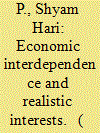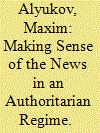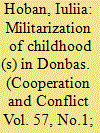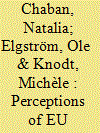|
|
|
Sort Order |
|
|
|
Items / Page
|
|
|
|
|
|
|
| Srl | Item |
| 1 |
ID:
193586


|
|
|
|
|
| Summary/Abstract |
The perception of conflicts between explicit political actors such as nation-states has an interesting peculiarity over its manifestation. When visible violent outbursts of conflict are absent, the international community often becomes optimistic and tends to envision a world matured from past failures (read conflict). This image is not formed by discounting the elements of latent conflict but is often built on the conviction that economic interdependence is infallible. The interdependence is understood to be such that, in a globalized world, often the perils—spillover effect of wars and the imposition of sanctions—deter conflict actors from engaging in one, and if engaged, not prolonging it. However, time and again, the repulsion between potential carnage and sanctions seems least effective. The international community is often taken off-guard by conflictual events that make them ponder if economic interdependence promoted through globalization is a true factor in preventing wars.
|
|
|
|
|
|
|
|
|
|
|
|
|
|
|
|
| 2 |
ID:
183973


|
|
|
|
|
| Summary/Abstract |
Scholars report contradictory findings regarding whether citizens trust media in autocracies. Relying on focus group methodology, this study uses Russian television viewers’ reception of the Russia–Ukraine conflict to investigate media perception in an autocracy. It argues that citizens in non-democracies lack the opportunities, motivation and tools to substantively process news. When perceiving news, they express both critical and supportive reactions towards the regime without integrating them into coherent views and thus support authoritarian equilibrium by being unable to articulate consistent opinions. This argument helps to explain the paradoxes of media (dis)trust and clarifies the process of media perception in authoritarian political systems.
|
|
|
|
|
|
|
|
|
|
|
|
|
|
|
|
| 3 |
ID:
184043


|
|
|
|
|
| Summary/Abstract |
This essay critically examines how the militarization of childhood(s) takes place in the Luhansk and Donetsk People’s Republics. The intensification of hostilities in Eastern Ukraine in mid-2014 has had a profound impact on local populations, particularly children. While no systematic recruitment and participation of children in conflict has been reported, childhood has become what Agathangelou and Killian would characterize as a ‘site for displacement and maneuvering for militarization.’ Drawing on feminist methodologies, I examine processes of the militarization of children’s everyday lives. This article investigates a range of ways in which authorities of proto-states in the Donbas region address children as participants and potential collaborators in the processes of militarization. In my analysis, I examine how war and preparation for it are simultaneously co-constituted by the geopolitical—legitimation of new proto-states—and everyday practices, such as engaging with school curricula, visiting museums, and (re)inventing historical narratives. Understanding of mechanisms that militarize childhood and how children become subjects and objects of militarization allows for a critical analysis that reveals spaces of everyday violence. This article, therefore, enhances our understanding about the intersections of childhood, militarism, and security.
|
|
|
|
|
|
|
|
|
|
|
|
|
|
|
|
| 4 |
ID:
170753


|
|
|
|
|
| Summary/Abstract |
A small but growing literature has started to analyse the European Union (EU) ‘as an effective peacemaker’. We make a contribution to this field by investigating EU mediation effectiveness in the Russia–Ukraine conflict. The focus is on perceptions of effectiveness. Based on information from semi-structured interviews, we compare EU self-images with Ukrainian evaluations of EU mediation efforts. How effective is the EU, including its Member States, deemed to be? What factors are believed to lie behind perceived (in)effectiveness? We concentrate on four such factors, derived from the mediator literature: perceived (im)partiality, coherence and credibility and, finally, evaluations of the EU’s mediation strategies. Both internal and external views singled out EU member states as the most effective actors in current mediation. The role of EU was seen in ambivalent terms by both sides. All the four determinants of mediation effectiveness are discussed in our material, but differ considerably in the degree of attention given to each of them. While (im)partiality is not a factor that is linked to effectiveness in any straightforward way, EU incoherence is associated with inconsistent and weak policies, notably in the Ukraine material.
|
|
|
|
|
|
|
|
|
|
|
|
|
|
|
|
|
|
|
|
|